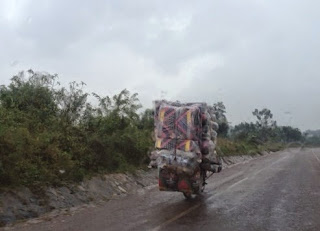A
Ankole cattle
Avocado
One of the most important fruits in Uganda. There is an avocado tree in the compound at work, which is full of fruit that are just ripening now. I have 3 avocados from the tree sitting in the kitchen ripening.
B
Boda Boda
The motorbike taxis are everywhere, particularly in the towns and cities but you also see them on the roads in the middle of nowhere. They often carry more than one passenger and I've seen whole families, Mum, Dad and 2 or 3 children on a boda. Ladies sit side saddle and look very elegant if slightly unsteady. I'm afraid I've never tried side saddle, I sit astride the boda and hang onto the back rail!!
They carry huge loads, far more than you would think it was possible to fit onto a motorbike. We've seen a 3 piece suite, lots of live chickens, a woman, goat and baby, a bed, a motorbike, the windscreen from a lorry, a solar panel, lots of matoke and a large pile of mattresses. It isn't easy to get pictures but here are some we have managed to catch.
Bananas
Uganda is, I think, the second highest consumer of plantains in the world. But a banana is not just a banana here there are lots of different varieties used for different purposes, in the same way as we have varieties of apples or potatoes. The matoke or savoury green bananas are sold in large bunches and make the mashed savoury banana cooked in banana leaves that is such a feature of lunch buffets here. Then there are beautiful small sweet bananas I had not seen before and the more familiar larger eating bananas.
C
Call to Prayer
A significant minority of the populations are Muslim and there are mosques in most of the towns and larger villages. I love hearing the call to prayer drifting across the valley at around 5.30 in the morning and also in the evening.
Climate Change
Travelling around the country you really notice climate change here. The dry seasons are longer and hotter and the wet season less predictable. The programmes to be delivered in the Sustainable Livelihoods area are starting to focus more on Resilience to Climate Change with training around water retention and irrigation methods. But changes are also needed to reduce the impact on the environment of activities such as charcoal burning and deforestation. Local people need help to find alternative ways to make a living.
Bags of charcoal for sale by the roadside in West Nile
D
Drums
A huge part of African culture, it sometimes feels like life is conducted to a drum beat. In the centre behind the house they have a traditional dance troupe, who practice on Saturday mornings and we hear the drum beat drifting down the hill.
Driving
Driving in Uganda and in much of Africa and other countries such as India, is just not like driving in Europe. Cars rarely keep to their own side of the road crossing to the other side to overtake or avoid potholes, often with little warning. Traffic comes straight out from a turning without even looking let alone giving way to traffic on the main road. Ugandan drivers are very impatient and will overtake on the inside or outside or both without a thought for traffic coming the other way. Glen somehow copes with it all, I will only drive on the quiet local roads to and from work!
E
English
English is the official language of Uganda, a fact for which I am very grateful. I have never had a problem talking to people as everyone speaks English, usually very well. Understanding the different accents on the telephone can be a challenge but everyone is used to me now and understands my English accent a bit better.
F
Farming
In a country where something like 80% of the population earn their living from farming, of which the majority are subsistence farmers, farming skills are incredibly important. Sadly many of the people we are working with are relatively recent returnees from the IDP (Internally Displaced Person) camps, where they stayed during the war in the north of Uganda. They only came back to their villages around 5 to 7 years ago and many of the skills normally passed from parent to child had been lost. Our partners are working with farmers groups to teach skills and give initial inputs so that they can start again. I was astonished to see oxen and ox ploughs featuring in the budgets and expenditure for the programme. Then a couple of weeks ago I was lucky enough to get a picture.
(I know I included this picture only a couple of weeks ago but it's a worth a second look!)








No comments:
Post a Comment